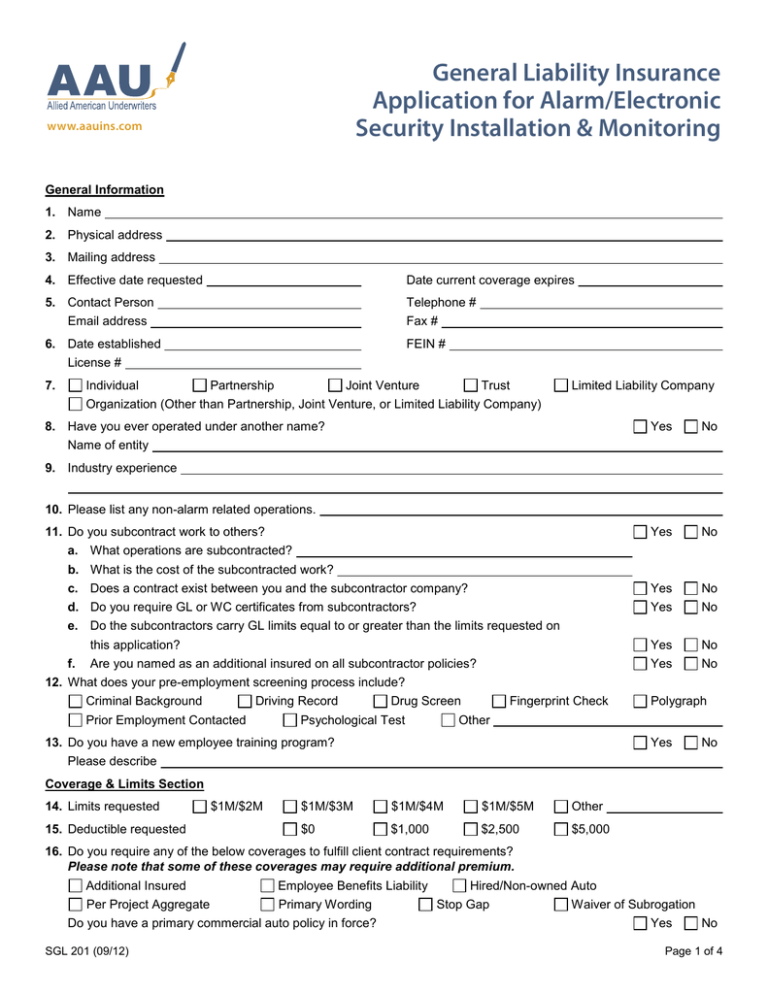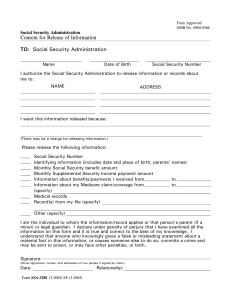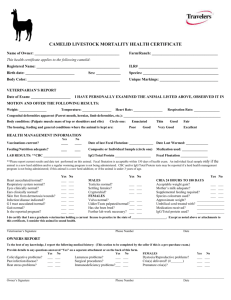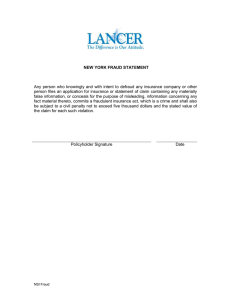General Liability Insurance Application for Alarm/Electronic Security
advertisement

General Liability Insurance Application for Alarm/Electronic Security Installation & Monitoring www.aauins.com General Information 1. Name 2. Physical address 3. Mailing address 4. Effective date requested Date current coverage expires 5. Contact Person Telephone # Email address Fax # 6. Date established FEIN # License # 7. Individual Partnership Joint Venture Trust Limited Liability Company Organization (Other than Partnership, Joint Venture, or Limited Liability Company) 8. Have you ever operated under another name? Yes No Yes No c. Does a contract exist between you and the subcontractor company? Yes No d. Do you require GL or WC certificates from subcontractors? Yes No this application? Yes No Are you named as an additional insured on all subcontractor policies? Yes No Name of entity 9. Industry experience 10. Please list any non-alarm related operations. 11. Do you subcontract work to others? a. What operations are subcontracted? b. What is the cost of the subcontracted work? e. Do the subcontractors carry GL limits equal to or greater than the limits requested on f. 12. What does your pre-employment screening process include? Criminal Background Driving Record Prior Employment Contacted Drug Screen Psychological Test Fingerprint Check Polygraph Other 13. Do you have a new employee training program? Yes No Please describe Coverage & Limits Section 14. Limits requested 15. Deductible requested $1M/$2M $1M/$3M $1M/$4M $1M/$5M Other $0 $1,000 $2,500 $5,000 16. Do you require any of the below coverages to fulfill client contract requirements? Please note that some of these coverages may require additional premium. Additional Insured Employee Benefits Liability Per Project Aggregate Primary Wording Do you have a primary commercial auto policy in force? SGL 201 (09/12) Hired/Non-owned Auto Stop Gap Waiver of Subrogation Yes No Page 1 of 4 17. Do you require excess/umbrella coverage? If “Yes,” what limit is needed? Yes $1M $2M $3M $4M No $5M If excess/umbrella coverage is required please complete the Excess Liability application. Alarm Operations Section 18. Number of employees Full time 19. Estimated annual sales 20. Alarm installation Part time Estimated annual payroll % Alarm monitoring % 21. Please provide percentage breakdown for your client base. Apartments % Medical/Hospital % Commercial % Schools/Colleges % Condominiums % Single Family/Tract Housing % Correctional/Penal % Other % Custom Homes % Please describe: Industrial % 22. Please provide percentage breakdown for all alarm installations and monitoring operations below. Some operations may require further explanation. Operations Burglar & Fire Alarm – Commercial % Sales/ Service/Installation % % Monitoring % Burglar & Fire Alarm – Residential % % Carbon Monoxide Detection % % CCTV/Video % % Home Detention/Penal/Correctional Systems % % Medical Emergency/Nurse Call Systems % % Medication Reminder Service % % PERS/Panic Button % % Temperature Control % % Utility Monitors (HVAC/Water/Gas) % % Water Flow on Sprinkler System % % Access Control/Card Key Entry % Automatic Sprinkler Systems % Central Vacuum/Home Theater/Intercom % Fire Extinguisher Service/Installation/Testing/Repair % Interior Tele-Com/Network % Manufacturing of Products % Preconstruction Wiring/Conduit % Retail Sales of Equipment/Products % Other % Please describe: 23. Do you take part in operations aboard aircraft, automobiles, mobile equipment and/or boats? Yes No 24. Is monitoring subcontracted or handled by a third party? Monitoring Company Yes No 25. Do end users sign a monitoring contract? Please attach a copy of your standard monitoring contract to this application for review. Yes No 26. Does a contract exist between you and the monitoring company? Please attach a copy of the contract between you and the monitoring company for review. Yes No 27. Do you require certificates of insurance from the monitoring company? Yes No SGL 201 (09/12) Page 2 of 4 28. Does the monitoring company name you as an additional insured? Yes No 29. Do you manufacture any products? Yes No 30. Do you obtain a certificate of insurance from the manufacturer of the products you sell? Yes No 31. Do you use only products approved by Factory Mutual or Underwriters Laboratories? Yes No 32. Do you repackage or add your own label to products you sell? Yes No 33. Do you employ security officers to provide alarm response? Yes No 34. Do you perform any design work for a fee that is not associated with your installation? Yes No 35. Do you perform any work at facilities where explosives are handled or stored or at nuclear power plants? Yes No Policy Information 36. Please provide prior year policy information below. Category Current Year First Prior Second Prior Third Prior Fourth Prior Carrier Premium Payroll Deductible Incurred Losses 37. Have any claims been made over the last five (5) years? Yes No 38. Do you have any knowledge of incidents that could lead to a claim in the future? If “Yes,” please explain. Yes No 39. Has your insurance been cancelled, declined or non-renewed in the last three (3) years? If “Yes,” please explain. Yes No 40. Total number of clients. 41. Please list your six (6) largest clients: Fraud Warnings Warning – Any person who knowingly, and with intent to defraud any insurance company or other person, files an application for insurance containing any false information, or conceals for purposes or misleading information concerning any fact material thereto, commits a fraudulent insurance act, which is a crime. Arkansas – Any person who knowingly presents a false or fraudulent claim for payment of a loss or benefit or knowingly presents false information in an application for insurance is guilty of a crime and may be subject to fines and confinement in prison. Colorado – It is unlawful to knowingly provide false, incomplete, or misleading facts or information to an insurance company for the purpose of defrauding or attempting to defraud the company. Penalties may include imprisonment, fines, denial of insurance and civil damages. Any insurance company or agent of an insurance company who knowingly provides false, incomplete, or misleading facts or information to a policyholder or claimant for the purpose of defrauding or attempting to defraud the policyholder or claimant with regard to a settlement or award payable for insurance proceeds shall be reported to the Colorado Division of Insurance within the Department of Regulatory Agencies. District of Columbia – WARNING: It is a crime to provide false or misleading information to an insurer for the purpose of defrauding the insurer or any other person. Penalties include imprisonment and/or fines. In addition, an insurer may deny insurance benefits if false information materially related to a claim was provided by the applicant. [DC Code] Florida – Any person who knowingly and with intent to injure, defraud, or deceive any insurer files a statement of claim containing any false, incomplete, or misleading information is guilty of a felony of the third degree. Kentucky – Any person who knowingly and with intent to defraud any insurance company or other person files an application for insurance containing any materially false information or conceals, for the purpose of misleading, information concerning any fact material thereto commits a fraudulent insurance act, which is a crime. Louisiana – Any person who knowingly presents a false or fraudulent claim for payment of a loss or benefit or knowingly presents false information in an application for insurance is guilty of a crime and may be subject to fines and confinement in prison. Maine – It is a crime to knowingly provide false, incomplete or misleading information to an insurance company for the purpose of defrauding the company. Penalties may include imprisonment, fines or denial of insurance benefits. SGL 201 (09/12) Page 3 of 4 Maryland – Any person who knowingly and willfully presents a false or fraudulent claim for payment of a loss or benefit or who knowingly and willfully presents false information in an application for insurance is guilty of a crime and may be subject to fines and confinement in prison. New Jersey – Any person who includes any false or misleading information on an application for an insurance policy is subject to criminal and civil penalties. New Mexico – Any person who knowingly presents a false or fraudulent claim for payment of a loss or benefit or knowingly presents false information in an application for insurance is guilty of a crime and may be subject to civil fines and criminal penalties. New York – ANY PERSON WHO KNOWINGLY AND WITH INTENT TO DEFRAUD ANY INSURANCE COMPANY OR OTHER PERSON FILES AN APPLICATION FOR INSURANCE OR STATEMENT OF CLAIM CONTAINING ANY MATERIALLY FALSE INFORMATION, OR CONCEALS FOR THE PURPOSE OF MISLEADING, INFORMATION CONCERNING ANY FACT MATERIAL THERETO, COMMITS A FRAUDULENT INSURANCE ACT, WHICH IS A CRIME, AND SHALL ALSO BE SUBJECT TO A CIVIL PENALTY NOT TO EXCEED FIVE THOUSAND DOLLARS AND THE STATED VALUE OF THE CLAIM FOR EACH SUCH VIOLATION. Ohio – Any person who, with intent to defraud or knowing that he is facilitating a fraud against an insurer, submits an application or files a claim containing a false or deceptive statement is guilty of insurance fraud. Oklahoma – WARNING: Any person who knowingly, and with intent to injure, defraud or deceive any insurer, makes any claim for the proceeds of an insurance policy containing any false, incomplete or misleading information is guilty of a felony. Pennsylvania – Any person who knowingly and with intent to defraud any insurance company or other person files an application for insurance or statement of claim containing any materially false information or conceals for the purpose of misleading, information concerning any fact material thereto commits a fraudulent insurance act, which is a crime and subjects such person to criminal and civil penalties. Rhode Island – Any person who knowingly presents a false or fraudulent claim for payment of a loss or benefit or knowingly presents false information in an application for insurance is guilty of a of a crime and may be subject to fines and confinement in prison. Tennessee – It is a crime to knowingly provide false, incomplete or misleading information to an insurance company for the purpose of defrauding the company. Penalties include imprisonment, fines and denial of insurance benefits. Virginia – It is a crime to knowingly provide false, incomplete or misleading information to an insurance company for the purpose of defrauding the company. Penalties include imprisonment, fines and denial of insurance benefits. Washington – It is a crime to knowingly provide false, incomplete or misleading information to an insurance company for the purpose of defrauding the company. Penalties include imprisonment, fines and denial of insurance benefits. West Virginia – Any person who knowingly presents a false or fraudulent claim for payment of a loss or benefit or knowingly presents false information in an application for insurance is guilty of a crime and may be subject to fines and confinement in prison. Signature Section Notice to applicants: this application must be completed in full as the quote will be based solely on the information provided. Any person who knowingly and with intent to defraud any insurance company or other person, files an application for insurance containing any false information, or conceals for the purpose of misleading information concerning any fact material thereto, commits a fraudulent insurance act, which is a crime. By signing this application, the signor warrants that to their best knowledge all information given is true and accurate. Principal, Owner or Officer Signature Title Principal, Owner or Officer Printed Name Date SGL 201 (09/12) Page 4 of 4


